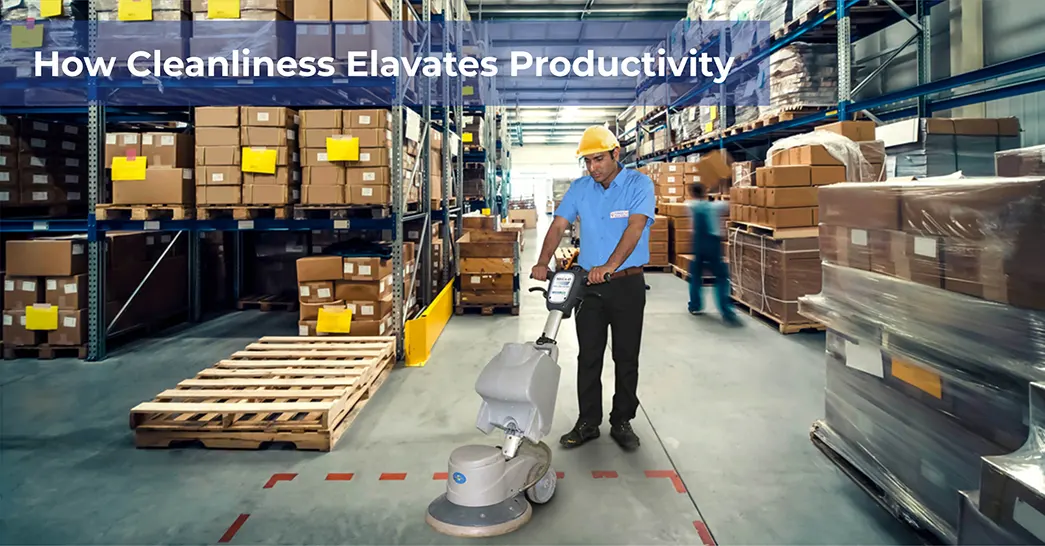In the fast-paced and competitive world of business, employee productivity is a cornerstone for any successful organization. Companies often invest in technology, training, process optimization, and facility management to pursue higher productivity levels. However, one crucial but often overlooked factor in this equation is the impact of housekeeping services at the workplace. Maintaining a clean and organized work environment can profoundly impact employee morale and safety, significantly influencing the employees' ability to perform their tasks efficiently. It can also positively improve their overall well-being and the company's bottom line.

The Connection between Efficient Housekeeping and Employee Productivity
1. Safety
A clean and well-organized workspace is a safer one. Cluttered areas can lead to accidents, such as trips, falls, and collisions. Housekeeping services play a pivotal role in maintaining a hazard-free environment, directly impacting employee safety and reducing workplace injuries.
2. Health and Well-being
A tidy workplace is not only safer but also healthier. Dust, allergens, and pathogens thrive in dirty and disorganized spaces, leading to health issues for employees. By keeping the workspace clean, housekeeping services contribute to the physical well-being of the workforce, reducing sick days and boosting overall morale.
3. Efficiency
An organized workplace allows employees to find tools, documents, and materials quickly. When items are readily accessible, employees can complete tasks more efficiently and with fewer interruptions. This, in turn, enhances productivity and reduces frustration.
4. Morale and Job Satisfaction
Employees who work in clean and orderly environments tend to have higher job satisfaction. A cluttered and messy workspace can lead to stress and decreased morale. On the other hand, a well-kept office fosters a more positive and comfortable atmosphere, which positively affects overall employee happiness and engagement.
5. Focus and Concentration
A cluttered workspace can be distracting, making it difficult for employees to focus on their tasks. Housekeeping services can help create an environment that promotes concentration, allowing employees to work more effectively and produce higher-quality results.
6. Professional Image
For businesses that interact with clients or customers in their offices, a clean and organized environment helps create a positive first impression. This professionalism can lead to improved relationships with clients and increased business opportunities.
Measuring the Impact
To assess the impact of housekeeping services on employee productivity, organizations can track various key performance indicators (KPIs) and metrics:
1. Employee Surveys
Regularly gather feedback from employees about their workplace environment, including cleanliness and organization. This can help gauge employee perceptions and identify areas for improvement.
2. Accident Rates
Monitor the number of workplace accidents and incidents before and after implementing improved housekeeping practices to evaluate the impact on safety.
3. Absenteeism
Track employee absenteeism due to illnesses or health-related issues to determine if improvements in workplace cleanliness lead to reduced sick days.
4. Productivity Metrics
Measure changes in individual and team productivity, such as project completion times, sales figures, or service delivery, to assess the effect of a cleaner workspace on overall output.
Implementing Effective Housekeeping Services
To realize the benefits of house keeping services, organizations should consider the following best practices:
1. Clear Protocols
Develop and communicate clear guidelines for housekeeping practices, including cleaning schedules, responsibilities, and safety procedures.
2. Training and Education
Provide employees with training on the importance of housekeeping and equip them with the necessary skills and knowledge to maintain a clean workspace.
3. Regular Inspections
Conduct routine inspections to ensure compliance with housekeeping standards and identify areas that require attention.
4. Adequate Resources
Invest in the right cleaning tools, equipment, and supplies to support effective housekeeping efforts.
5. Employee Involvement
Encourage a culture of shared responsibility, where all employees contribute to maintaining a clean and organized workspace.
The connection between integrated facility management, including housekeeping, and employee productivity is clear and substantial. A clean, organized, and safe workplace, maintained through integrated facility management practices, enhances employee well-being, fosters a positive work environment, and directly contributes to increased efficiency. Organizations that recognize the value of integrated facility management, with housekeeping as an integral part of their operations, are likely to reap the benefits of increased productivity, improved employee satisfaction, and an overall more positive work atmosphere. Therefore, it's essential for businesses to acknowledge the importance of integrated facility management, including housekeeping, as a fundamental factor in their quest for higher productivity and success.
Also Read : https://ffservices.co.in/blog/the-evolution-of-facility-management-in-india.php
